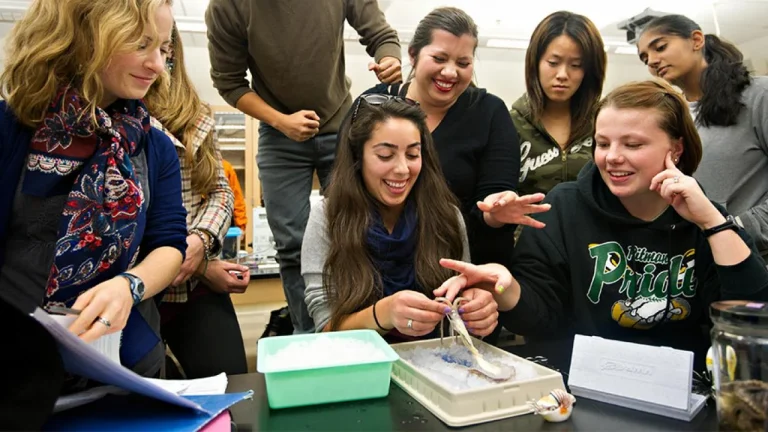Forensic Science Vs Forensic Psychology: Unraveling The Differences
With popular TV shows like CSI, Criminal Minds, and Dexter, the fields of forensic science and forensic psychology have captured public fascination. But while they intersect around crime, forensics, and the law, the two disciplines have distinct roles and responsibilities.
If you’re short on time, here’s a quick answer: Forensic science focuses on collecting and analyzing physical evidence while forensic psychology applies psychological knowledge to criminal justice. Forensic scientists work in labs and crime scenes while forensic psychologists work in law enforcement and courtrooms.
In this comprehensive guide, we’ll analyze the academic paths, professional duties, work environments, and career outlooks of both fields. Whether you’re drawn to microscopes or motives, read on to determine if forensic science or forensic psychology best fits your interests and talents.
Academic Backgrounds and Training
When it comes to academic backgrounds and training, forensic science and forensic psychology differ in the specific fields of study they focus on.
Forensic science degrees: Chemistry, biology, biochemistry
Forensic scientists typically pursue degrees in fields such as chemistry, biology, or biochemistry. These disciplines provide them with a strong foundation in scientific principles and techniques that are essential for analyzing physical evidence found at crime scenes.
By studying chemical reactions, DNA analysis, and other scientific methods, forensic scientists are equipped to examine and interpret evidence to help solve crimes.
Forensic psychology degrees: Psychology, criminal justice
On the other hand, forensic psychologists pursue degrees in psychology and criminal justice. Their training focuses on understanding human behavior, mental processes, and the criminal justice system. Forensic psychologists study how psychological factors can influence criminal behavior and work closely with law enforcement and legal professionals to provide insights on criminal profiling, witness testimonies, and mental health evaluations.
It is important to note that while forensic psychologists do not have the same scientific training in biology and chemistry as forensic scientists, they still play a critical role in the criminal justice system by applying their knowledge of human behavior to help solve cases.
Both complete internships for practical training
Both forensic scientists and forensic psychologists are required to complete internships as part of their training. These internships provide hands-on experience in real-world forensic settings, allowing students to apply their theoretical knowledge to practical situations.
During their internships, they may work alongside experienced professionals, gaining valuable insights into the field and honing their skills.
Forensic science and forensic psychology both require a strong academic foundation and specialized training to excel in their respective fields. Whether it’s analyzing physical evidence or understanding the psychological aspects of criminal behavior, these professionals contribute to the pursuit of justice in their own unique ways.
Day-to-Day Work and Responsibilities
Forensic scientists: Collect and test physical evidence
Forensic scientists play a crucial role in crime investigations by collecting and analyzing physical evidence found at crime scenes. They carefully document and preserve evidence such as fingerprints, DNA samples, fibers, and firearms, using specialized techniques and equipment.
Once the evidence is collected, forensic scientists employ various scientific methods to examine and test it, aiming to identify any relevant information that can help solve a case. Their work often involves analyzing blood spatter patterns, identifying chemicals, and matching DNA profiles to potential suspects.
Forensic psychologists: Interview, assess, and profile criminals
On the other hand, forensic psychologists focus on the human aspect of criminal behavior. Their primary responsibility is to interview and assess individuals involved in criminal cases, including both victims and suspects.
They use their expertise in psychology to understand the motivations, thought processes, and behavioral patterns of criminals. Forensic psychologists conduct interviews and administer psychological tests to gather information that can help in creating profiles of suspects or understanding the impact of a crime on the victim’s mental state.
By analyzing the psychological factors at play, they contribute to the overall understanding of a case and aid in developing effective strategies for investigation and trial.
Forensic scientists: Reconstruct crime scenes, determine cause of death
One of the key tasks of forensic scientists is to reconstruct crime scenes. They meticulously analyze the physical evidence, such as bloodstains, bullet trajectories, and footprints, to recreate the sequence of events that occurred during a crime.
By utilizing their expertise in physics, chemistry, and biology, forensic scientists can provide valuable insights into how a crime unfolded. Additionally, they also play a vital role in determining the cause and manner of death in cases involving suspicious or unexplained deaths.
Through autopsies, toxicology tests, and examination of medical records, forensic scientists help establish the cause of death and provide critical evidence in criminal investigations.
Forensic psychologists: Develop strategies for interrogation, reducing recidivism
Forensic psychologists contribute to the justice system by developing strategies for effective interrogation techniques. They study the psychological factors that can influence the behavior of suspects during interrogations and work towards improving the accuracy and reliability of information obtained during these sessions.
Moreover, forensic psychologists also play a role in reducing recidivism rates by working with offenders. They assess and evaluate the mental health and risk factors of individuals who have committed crimes, and develop intervention programs to address their underlying issues.
By focusing on rehabilitation and reducing the chances of reoffending, forensic psychologists contribute to the overall goal of creating a safer society.
Work Environment Comparison
Forensic scientists in labs, morgues, and crime scenes
Forensic scientists primarily work in laboratories, morgues, and crime scenes, where they meticulously analyze evidence and conduct experiments to help solve crimes. They often wear protective gear and work with hazardous materials such as chemicals and biological samples.
This is to ensure their safety while handling potentially dangerous substances. The work environment for forensic scientists requires precision, attention to detail, and the ability to work independently or as part of a team.
According to the Bureau of Labor Statistics, the demand for forensic scientists is projected to grow 14% from 2019 to 2029, making it a promising career choice in the field of forensic science. For more detailed information on the work environment and job outlook for forensic scientists, you can visit the Bureau of Labor Statistics website.
Forensic psychologists in police departments, courts, and correctional facilities
On the other hand, forensic psychologists typically work in police departments, courts, and correctional facilities, where they apply their expertise in psychology to assist with legal matters. They evaluate individuals involved in criminal cases, including suspects, witnesses, and victims, to determine their mental state and assess their competency.
Forensic psychologists may also provide expert testimony in court proceedings. Unlike forensic scientists, forensic psychologists have a more direct interaction with individuals in the criminal justice system.
They may conduct interviews, administer psychological tests, and provide counseling services. The American Psychological Association provides valuable information on the work environment and career paths for forensic psychologists on their website.
Forensic science higher exposure to hazardous materials
While both forensic scientists and forensic psychologists play vital roles in the criminal justice system, it is important to note that forensic scientists have a higher exposure to hazardous materials.
This is due to their work in laboratories, morgues, and crime scenes, where they handle potentially dangerous substances. They must follow strict safety protocols and wear protective gear to minimize the risks associated with their work.
Forensic psychologists, on the other hand, do not have the same level of exposure to hazardous materials in their work environment. However, they may encounter challenging situations when dealing with individuals who have mental health issues or a history of violence.
Forensic psychology requires travel to see inmates/suspects
Unlike forensic scientists who primarily work in fixed locations such as laboratories, morgues, or crime scenes, forensic psychologists often have to travel to see inmates and suspects. This is because they need to conduct psychological evaluations and assessments in correctional facilities or other locations where the individuals are housed.
Traveling is an essential part of the job for forensic psychologists as they gather information to form a comprehensive understanding of the individuals they are evaluating. This aspect of the work environment adds a dynamic element to the role of a forensic psychologist and requires flexibility and adaptability.
Career Advancement Opportunities
Forensic scientists can specialize in areas like DNA, toxicology
Forensic science offers a wide range of career advancement opportunities for professionals looking to specialize in specific areas. One such area is DNA analysis, where forensic scientists work closely with law enforcement agencies to identify suspects and establish connections between individuals and crime scenes.
Another specialization option is toxicology, which involves analyzing bodily fluids and tissues to determine the presence of drugs, alcohol, or other substances. These specialized areas within forensic science allow professionals to develop a deep expertise and contribute to solving complex criminal cases.
Forensic psychologists can become lead profilers or consultants
Forensic psychology also presents numerous career advancement opportunities, particularly for individuals interested in understanding the criminal mind and behavior. One possible career path for forensic psychologists is becoming a lead profiler, where they use their expertise to create profiles of criminals based on behavioral patterns and psychological characteristics.
These profiles are invaluable in criminal investigations and can assist law enforcement agencies in narrowing down their search for suspects. Additionally, forensic psychologists can also work as consultants, providing expert opinions and analysis in legal cases, which can have a significant impact on trial outcomes.
Both fields allow opportunities to publish research and teach
Both forensic science and forensic psychology offer professionals the chance to publish their research findings and contribute to the advancement of their respective fields. By conducting studies and experiments, forensic scientists can contribute to the development of new investigative techniques, technologies, and methodologies.
Similarly, forensic psychologists can conduct research on topics such as criminal behavior, eyewitness testimony, and jury decision-making, which can provide valuable insights into the criminal justice system.
Furthermore, professionals in both fields also have the opportunity to teach at universities or colleges, sharing their knowledge and expertise with the next generation of forensic scientists and psychologists.
According to the American Academy of Forensic Sciences (AAFS), professionals in both forensic science and forensic psychology have the opportunity to advance their careers through continuing education, attending conferences, and joining professional organizations.
These activities provide networking opportunities, access to the latest research, and the chance to collaborate with experts in the field.
Job Outlook and Salary Prospects
Steady job growth projected in both fields over the next decade
Both forensic science and forensic psychology are promising fields with steady job growth expected in the coming years. According to the Bureau of Labor Statistics, the employment of forensic science technicians is projected to grow 14 percent from 2019 to 2029, which is much faster than the average for all occupations.
Similarly, the demand for forensic psychologists is also expected to increase due to the growing need for their expertise in criminal investigations and court proceedings.
Higher pay generally for forensic scientists vs psychologists
When it comes to salary prospects, forensic scientists generally tend to earn higher pay compared to forensic psychologists. The average annual salary for forensic scientists in the United States is around $60,000 to $80,000, depending on factors such as experience and location.
On the other hand, forensic psychologists typically earn an average annual salary of $50,000 to $70,000.
Experience level impacts salaries significantly
It’s important to note that experience level plays a significant role in determining salaries in both fields. As forensic scientists and forensic psychologists gain more experience and expertise, their earning potential increases.
For example, a forensic scientist with several years of experience and specialized skills may earn a higher salary compared to someone who is just starting out in the field. Similarly, forensic psychologists who have established themselves as experts in their field and have a strong track record may command higher salaries.
It’s also worth mentioning that salaries can vary depending on the location and the organization where one works. Forensic scientists and forensic psychologists working in metropolitan areas or for federal agencies may have higher earning potential compared to those working in smaller cities or for local government agencies.
For more information on job outlook and salary prospects in forensic science and forensic psychology, you can visit the Bureau of Labor Statistics website.
Conclusion
While forensic science and forensic psychology complement each other around criminal investigations, they appeal to different talents and interests. For those who love lab work, forensics offers a path to analyze physical clues.
For people persons adept at psychology, forensic psychology provides a way to get inside the criminal mind.
By weighing factors like education, responsibilities, environment, career development, and earning potential, individuals can determine which field better suits their skills and passions. Both professions offer exciting ways to promote justice, safety, and order in society through science and psychology applied to legal settings.







